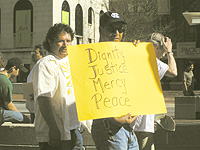State of the Latino Community
BY CATHY HOLT
 |
|
Latino\’s issues are the same as many other people\’s issues, such as access to education and to health care. Photo by Johnnie Grant. |
Barriers to higher education, job and housing discrimination, exploitation, stress and emotional isolation are just a few of the problems faced by undocumented Latino immigrants.
Add to that the political pressure to crack down on the
undocumented and their demonization by many elected officials and
talk-show hosts, and immigration reform becomes a very hot topic.
To understand the issues in Asheville\’s Latino community, we
interviewed several community leaders: Andrea Arrias of the Center for
Participatory Change; Edna Campos, community advocate and cofounder of
ALAS (Asheville Latin Americans for Advancement); Juan Antonio Garcia
of the Catholic Diocese; and Althea Gonzalez of the Buncombe County
Medical Society\’s Interpreter Network.
Education
Despite the hurdle of learning a new language while struggling with course material in English, children of immigrants in public schools throughout Western North Carolina show the same range of ability and enthusiasm as any other group. But many immigrant parents work two or three jobs to make ends meet, leaving little time to engage with the school system. Most speak less English than their children, so helping their children with homework is not an option. Fear of challenging authority, distrust of officials, and culturally based respect for teachers conspire to keep parents from participating in their children\’s education.
Even for students who do well in school, a new set of barriers emerges. Instate tuition is limited to legal residents of North Carolina. “Imagine a young Latina woman at the top of her class who wants to become a doctor, and has lived in America since age five,” says Althea Gonzalez. “Her tuition will be two or three times that of a citizen.”
Edna Campos notes that young people without documentation “can\’t participate in a lot of scholarships either, such as the federal Pell grants. As for going back to the country of their birth to get a degree, they don\’t want to leave their families and friends for a place that isn\’t even their home. Unfortunately we\’re not doing enough to encourage these students to finish high school. Nationally, we face a real dilemma with dropouts.”
The state loses economically because it doesn\’t offer equal education opportunities to children who lack documentation. “College can be a way to break the cycle of poverty,” says Andrea Arrias. “With no prospects of going to college, some students don\’t even see the point of finishing high school; then, they get into gangs. If they could get that education, they could get better jobs, it would improve the economy and they could give back to the community.”
Gonzalez points out that even if that top-of-the-class student makes it through college and medical school, she wouldn\’t be able to practice medicine without a social security number. “A lawyer, a massage therapist, a psychologist – they can\’t work in those fields even if they have all the education. What sense does that make?” she asks.
Exploitation and Discrimination
Undocumented immigrants also face discriminatory barriers and exploitation in housing and jobs. Gonzales notes, “Our federal laws protect people in housing and in employment, regardless of documentation status, but immigrants aren\’t aware of this. People are rented a place, told that they have to put down a huge deposit for electricity, for example, then evicted for no real reason and they lose their deposit. Fair housing violations are happening not just to Latinos but to other recent immigrants such as Russians and Chinese. Their countries may have different laws, or no laws about housing; or they may come from countries where the police cannot be trusted, so they don\’t feel comfortable about going to the police to report a violation. They may not know it\’s a violation, and don\’t know who to report it to.”
Similar ploys are used in employment, she says. “Companies will hire [them] and then after a couple weeks they\’ll say, “INS is coming! You\’ve got to get out of here!\’ and don\’t give them their paycheck. They rotate through other immigrant populations and do the same thing. There is a real need for information, knowing their rights, knowing where to get assistance,” says Gonzalez.
Stress and Isolation
 |
| Edna Campos — co-founder of Asheville Latin Americans for Advancement |
For the undocumented in particular, the exploitation, discrimination, fear of discovery and deportation, can lead to profound isolation and constant stress.
“They live on the margins,” says Campos. “Most Americans think nothing about going for a job interview, going to a clinic for health services, or to a school to see that their child\’s needs are met; but there\’s a lot of hesitation in Latinos because they\’re not sure how they will be received, due to stereotypes and assumptions people make about who we are.”
Adds Juan Antonio Garcia, “It\’s really sad to see how the undocumented suffer. Two years ago I met a young man who was going back and forth from Asheville to Florida, looking for work. He\’d worked in restaurants, and was treated very badly in both places because he didn\’t have papers. I had to take him to a mental hospital in Morganton, he was so traumatized. He stayed there two weeks.”
The strain on the community and its shared culture can also add to stress and harm families. “It\’s hard to integrate in a community while preserving the richness of your own culture,” muses Andrea Arrias. “Families are very important for us, but people come here, work two or three jobs, and send money home to their family. Families are separated – all my family members are in Colombia. And even if their families are here, they work such long hours that they don\’t have time to spend with their children; their children are learning more English than Spanish, not learning to write or read Spanish, or even to speak it well. So we are losing a lot of that culture. I feel angry about that. Parents come here to make a better life for their children, but they end up not spending quality time with their children. I have friends who work seven days a week and have no time for their children. If you earn $6 an hour, it\’s not a living wage. It isn\’t the parents\’ fault.”
Garcia points out what is often overlooked in the political debate over illegal immigration. “People are not here because they are terrorists, they simply want to get a job and do right by their family. It\’s a Christian country, supposedly, but there\’s so much injustice.”
Other Problems
Undocumented workers face numerous other problems related to their lack of papers. “Public transportation is bad in Asheville, and in rural areas it\’s even worse,” says Arrias. “But people have to go to work.”
Campos says, “It\’s so important for those of us who have the opportunity to be more vocal, to challenge the system, to vote, and speak to elected officials. We have the responsibility to do that for our fellows, not just Latinos, but other undocumented immigrants.” She is working with the city to create a friendlier bus schedule and other improvements, like providing more buses and more extensive schedules. She regularly reminds elected officials that, “Our issues are the same as many other people\’s issues, such as access to education and to health care.”
“I see the need for people to have legal assistance; Pisgah Legal Services, Catholic Social Services, are not enough,” says Garcia. “If we were to have immigration reform tomorrow, it would still be very hard for people to find a lawyer and get their papers straight. Health care is another thing. The Health Department [serves] everyone, but I know that the AIDS cases are increasing within the Hispanic community. In Latin America, there is more outreach, giving education around prevention and promoting health care.”
Relationships with Other Minority Groups
Buncombe County hosts immigrants from former Soviet Union countries, Koreans, Vietnamese, and Hmong. “These are all people we could work with,” says Campos. “There\’s been some resource sharing between Latinos and the former Soviet Union community, but most of that has been on public issues, like the Buncombe County Health Department recognizing the need for translation services.”
Other minority groups face similar barriers, so there are opportunities to build coalitions. “The Afro-tina organization has been helping bring African Americans and Latinos together around common concerns, and it\’s a way for us to get ahead of some attempts to pit us against one another, by building a consensus with other people who are like us,” says Campos.
Arrias believes that immigrants are going through what African Americans experienced when they could not access higher education. “Africans were brought here as slaves, while Latino immigrants are pushed to come here because of globalization and poverty. The immigration rights movement is similar to the Civil Rights movement.”
She is involved in a coming Youth Summit of African American and Latino kids sponsored by the Asheville-Buncombe Community Relations Council. “Sharing our struggles and our successes is a good point to start,” says Arrias. “In Brevard, where I used to live, the kids didn\’t hang out together. There is a lot of prejudice and stereotypes; people are played off against each other. Blacks believe that Latinos are taking their jobs, Latinos say that blacks are lazy.”
Garcia points to Christians for a United Community, “a group of African Americans, Latinos and whites that get together and talk about racism and are trying to dismantle these problems. The leaders are willing to work together, but it\’s hard to promote the relationships partly due to the language barrier.”
 |
| Althea Gonzalez — of the Buncombe County Medical Society’s Interpreter Network. |
Gonzalez adds, “Typically, the “new kid on the block\’ is perceived as taking away something from the older kid. There\’s job competition, competition for services; and also the focus on the new population\’s problems diminishes the focus on the long-standing issue of racism. We see conflicts in the schools, gang problems, although in Asheville it\’s not as explosive as in bigger cities. The more we are proactive in unifying people, the better.”
She would like to see a counterpart to the Building Bridges program, which brings together blacks and whites to discuss issues of racism and get to know one another. “It would be great if there could be some version of that course with the focus on Latino issues. In Winston-Salem they\’re doing monthly round table discussions to talk about stereotypes that exist on both sides, providing a forum for people to get together and talk as human beings. Who are we really, and what are our commonalities? When you get to know people, you find common ground, but if you don\’t know them, you think they are different.”







